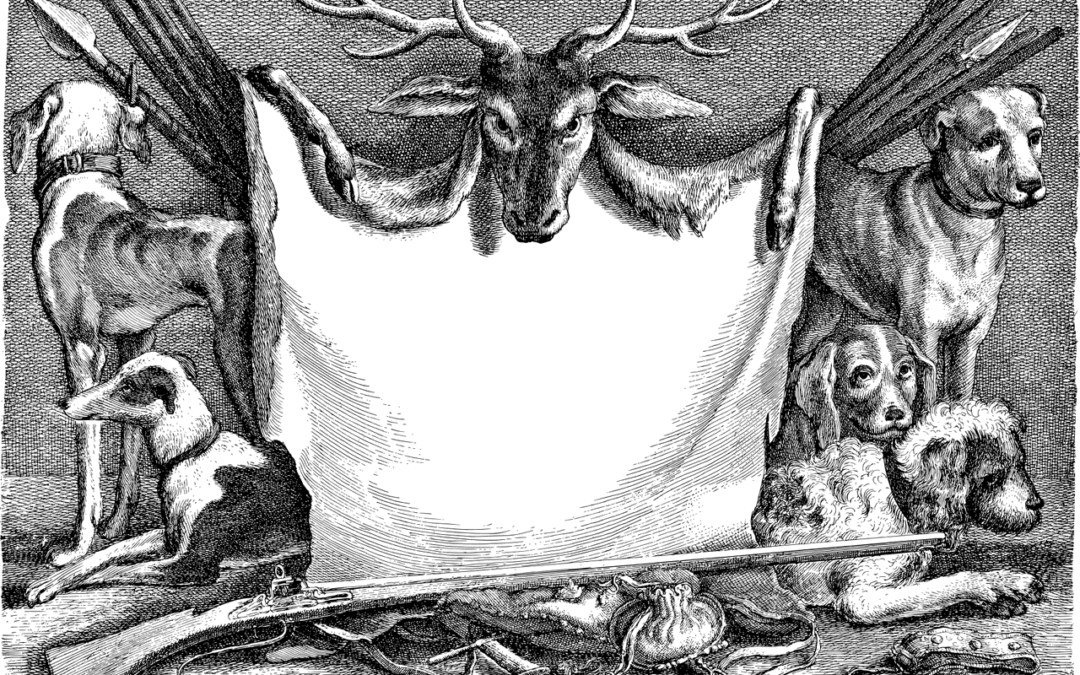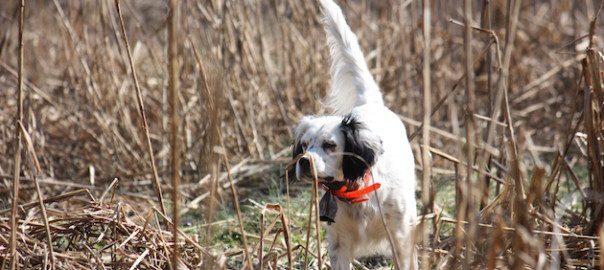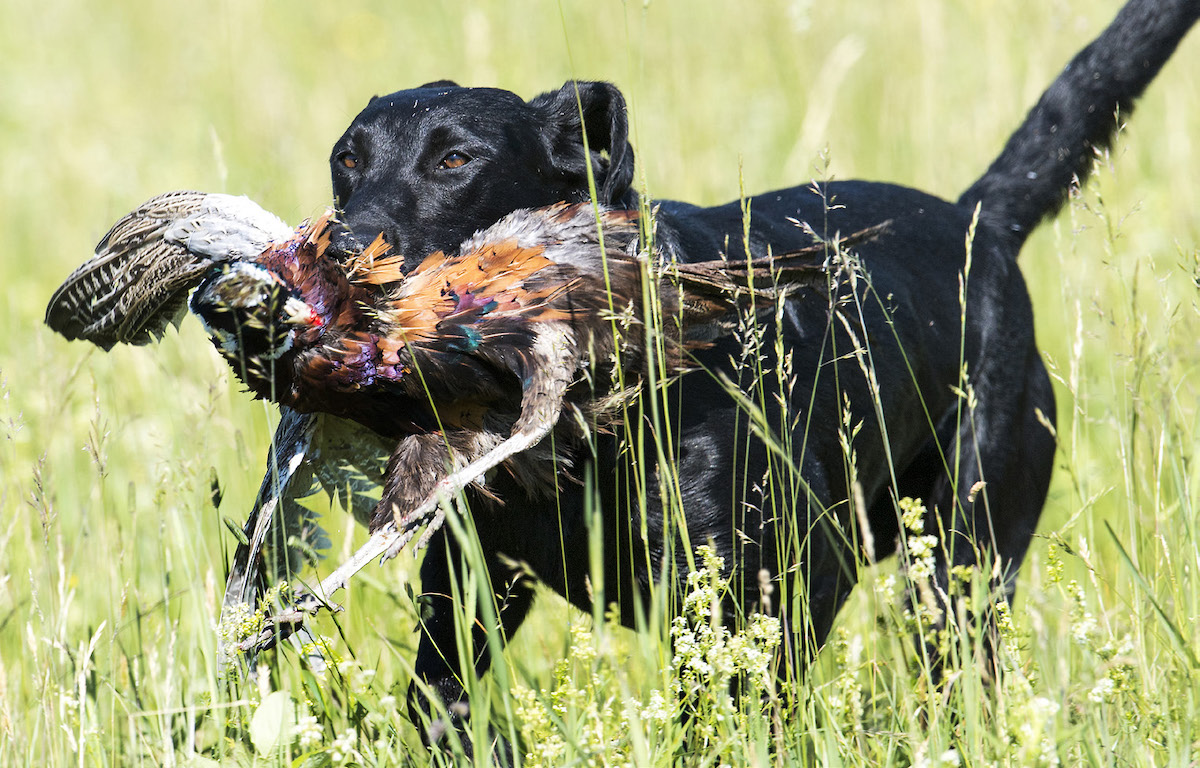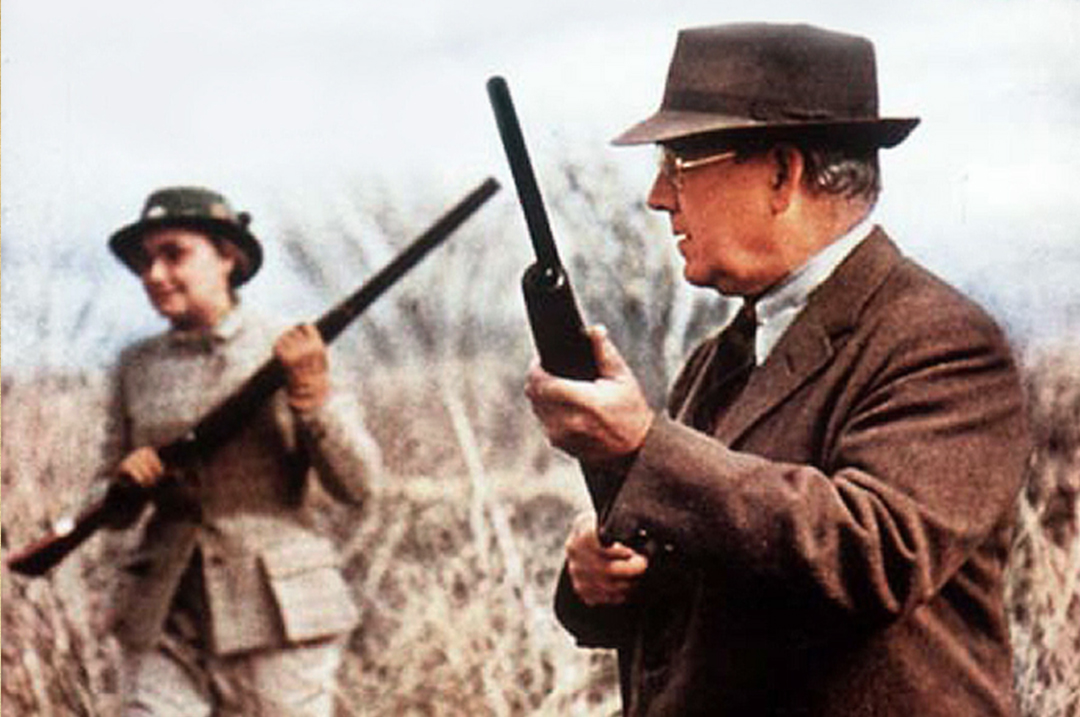How many good dogs you gonna bury before one buries you?
Blue weighed 90 pounds, with webbed feet big as biscuits, long legs and a deep chest, the biggest Lab bitch I ever saw, out of Tomahawk, Wisconsin, from a kennel of field champions. An undertaker gave her away. He never knew when he might be called he said. Blue would nose the breeze, break loose, run down and swim in the Mississippi, 17 blocks from home at her extreme peril. She came with a doghouse made of salvaged casket crates.
That was St. Paul where I broke down on my way to Alaska and holed up 20 miles north of the city in a farmhouse made out of defunct Soo Line boxcars. I could stand on my back porch, look toward my chicken coop and see the birch clump where I killed two fine bucks and to my left the flashing strobe atop the IDS Center in downtown Minneapolis. Gort we called it, from the ray-gun robot in The Day the Earth Stood Still. We would get all tuned up and holler “Gort, Klaatu barada nikto!” the command to make him go away. We bellered it for years, but the IDS tower never even twitched.
I always had dogs, generally some indifferent boyhood cur or three, but I had no idea how utterly sensitive a good dog could be, and I whupped Blue for killing a chicken. She never killed another chicken, but she never brought a bird to hand either, faithfully making every retrieve but piling them in her own stash forty yards down the bank.
But her most perfect retrieve was a George L. Herter skinning knife. Maybe you remember the fantastic mail-order Herter’s, the smiling decoys that rode the water like their gizzards were full of wild celery, the lures guaranteed to catch fish when nothing else would, the Kenyan coffee, the investment-grade diamonds, the fly-tying feathers from exotic birds, the coon calls, the cluck calls, the coyote calls, the goose calls, but especially the knives, worldwide designs replicated in the States. His skinning knife was close to a Canadian Russell Belt Knife, a razor-sharp teardrop blade attached to an ergonomically shaped handle of African tiger wood, and I prized it above all others.
I prized it but lost it twice. First time was field-dressing a deer. Blue backtracked my trail, nosed around in the leaves, and brought it back to the farmstead, a full half-mile. Second time, a green-broke horse bucked it right out of the scabbard, but Blue was in the ground by then. I buried her in a sunny spot along the lilac hedge she loved, where her bones made blue flowers every June.
I came to Lacy by way of a divorce, not mine though I had several. There was an ad in the local farm shopper: “Give away to good home, two year old female Chesapeake.” Momma was going one way, Papa the other. They split the house, one got the pickup, one got the car but they could not split the dog. Maybe you know about the Chesapeake, the most notoriously obstreperous blockhead of the retrievers. Legend says they came from a pair of yellow dogs, a sire and a bitch, sole survivors of a Spanish shipwreck. If it ain’t true, it oughta be. A Chessie is tougher than a white oak plank.
Lacy had a short and dense curly coat, always greasy with dog oil and yellow eyes to the envy of any aspiring Hollywood starlet. It was 40 miles to get there in the dark, and I had babies by then and I took my beloved Laura along, named for Laura Ingalls, the little girl from the little house in the big woods. Laura toddled around the house and the man turned the dog loose and Lacy rushed the child.
My heart in my throat, I thought, I am fixing to find out real quick if I want this dog.
Lacy came at Laura at a full run, peeled leaves when she skidded to a stop. She sat before her and gently nosed the middle of her chest, bump, bump.
“I’ll take her,” I said, and 30 years later it still breaks my heart.
Seventy-three Ford three-quarter-ton single cab, dark-30 and 10 degrees, a green dog and toddler, no child restraints in those days. Dog went into the back, chained to an eye-bolt in the middle of the bed. Half-way home there arose a piteous howling. I pulled over and, in the taillight dim, Lacy was hogtied in chain. I unraveled her and threw her into the cab with us. She was my dog forever thereafter, grateful I saved her life but never reasoning my stupidity was responsible for her distress.
And she had inordinate faith in my shooting. If I shot twice, by God, there must be two ducks down and she would bolt to find the second, oblivious to commands to the contrary. She typically ran behind the pickup a mile to the lake, swam across, made innumerable retrieves, then ran home. That wore her out, mostly.
I came home too late one afternoon and Sweet Wife met me in the yard with a great litany of complaint and a torrent of accusation. Lacy weaseled between us, stood on her hind legs, put her great paws on my shoulders and licked my cheeks and chin during the tirade. “And furthermore,” Sweet Wife bellered, “I don’t see why you love that damn dog so damn much!”
“’Cause she is always glad to see me,” I said, “and she never complains.”
In old age Lacy became intolerably cranky, boiling from beneath the steps and putting a nimble neighbor lad atop his car. A neighbor girl was not so fleet, and Lacy nailed her square in the ass. By then it was more a gumming than a bite, but one worn canine managed to pierce jeans and skin. There was talk of litigation.
“I have been disfigured!” The neighbor girl dropped her britches to show a red mark the size of a number 2 pellet on her otherwise perfect cheek. “I did not know,” I replied, “you were considering a career as a porn star.”
It cost my insurance man eight grand anyway.
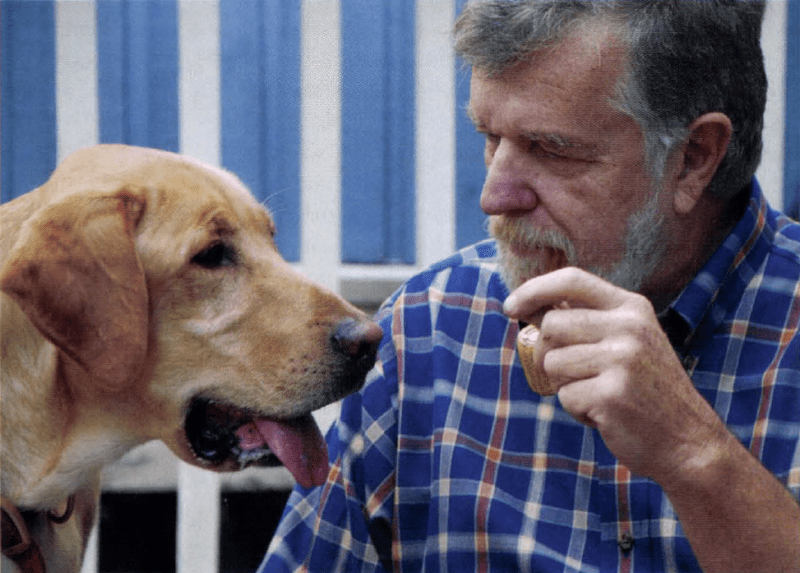
Roger Pinckney and his yellow Lab, Zebo, in a deep philosophical discussion.
Porgy was a Newfoundland, or mostly so. No papers, just another giveaway. I drove down to Minneapolis to pick him up. Halfway there, I stopped at a liquor store and snagged a wooden wine crate for his first puppy bed. I lined it with an old beach towel but at eight weeks, he would not fit. Porgy rode home stretched across most of the seat with his head on my knee.
Explorer Meriwether Lewis took a Newfoundland to the Pacific and back, retrieved him from dog-rustling Indians at gunpoint. Lord Byron bedded 200 women on his Italian expedition, but wrote his best-known poem to Boatswain, his Newfoundland dog. Boatswain died of rabies, and Byron nursed him to the end and never got bit.
Porgy had the soft, intelligent eyes of a great ape and eventually learned forty-odd commands. I boiled down venison bones and made gruel with bulk rolled oats from the hippie health food store. He slept beneath my bed at first and extricated himself each dawn with increasing grunting and rattling of elbows and knees until one morning I had to peel mattress and springs to set him loose. He hit 100 pounds at six months and did not stop till he reached 160 a year later. I fitted a red collar with a bell so none of the neighbors might shoot him for a bear. He was a hair factory, and a black cloud rose whenever he shook himself. Let it grow and there were long hairs in the butter; shave him, and there were short.
Porgy flushed and fetched grouse and pheasant, but he would sit by a downed woodcock and bark ‘til I picked it up myself. It was bacon, beans and kerosene in those days and the cottontails I popped from my back door at daybreak. Porgy heard the .22 crack.
“Rabbit, Porgy, rabbit!” Nose down, he would run the treeline and within two minutes, I’d have a fresh cottontail in hand. Butcher it and wrap skin and guts in a back issue of The Fargo Forum, and I’d have supper in the fridge while still in my slippers. And a Minnesota cottontail deep fried in cornbread batter would make a factory-farm chicken hang his head in shame.
I bought Porgy a harness, the biggest I could find. He’d drag the skiff to the water, fetch the ducks, pick up the decoys and drag the skiff uphill when we were done, though I could never get him to wind the anchor strings. Snowed in, he pulled a sled of groceries to the house, a quarter-mile uphill. I soon learned to get out of the way as Porgy would be waiting in the yard when I finally huffed my way home.
He served me faithfully and well a dozen years, a long time for a dog his size. Porgy disappeared three days before Christmas. I had almost given him up for lost when on Christmas Eve there came moaning and whining from beneath the house.
“Get up Porgy, oh please get up!”
And when he could not, I ended him with a single pistol shot and crawled around the yard bellering like a lost calf. I buried him where the digging was easy. But I did not end Porgy. Twenty years later, he still comes to me in dreams.
I was back home on Daufuskie Island, beautiful, remote and sparsely settled, when a tattered and bleared assemblage showed up at my door, begging help in defeating a lock-harbor marina developer who wanted to dredge into the heart of the island. The depositions, allegations and recriminations ate up ten otherwise perfectly good years. When the dust finally settled, there was no lock harbor nor would there ever be; three-quarters of the land was under conservation easement, I had the hunting rights and my former adversary became a dear friend. And then he gave me a yellow dog.
Zebo was a four-year-old Lab the color of a new penny, a “fox red” English dog men say. My friend’s boys had gone off to college and the wife could not handle him, so poor Zebo was exiled to the kennel and had no house manners whatsoever. First day he broke an ear off my black bear rug but I was quick on the trigger of a glue gun. He put his nose through a windowpane, but I patched it with cardboard. He stole a steak off my plate, but I stole it back.
I had two young boys of my own by then and the three of them ran each other ragged. Zebo slept with them and lying in bed mornings was not an option. From his twitching of ears and eyes, it soon became apparent he understood English and even a little Spanish, so we took to spelling out things we wanted secret. He had a wonderful nose, and I worked him at night with the baton just to hear him pop, snort and snuffle.
I’d only had him four months when I took desperately sick with tick fever. I was waiting on the medivacs when Zebo leapt atop the bed, stretched out beside me and pressed the whole length of his body against mine, as if his love could make me well again. I did not die, so maybe it did. Will I bury this dog like I have all the others, or will he bury me? I can’t decide which would be worse. But I know this: If there are dogs in heaven, there should be at least four waiting for me. If there ain’t, I don’t want to go.
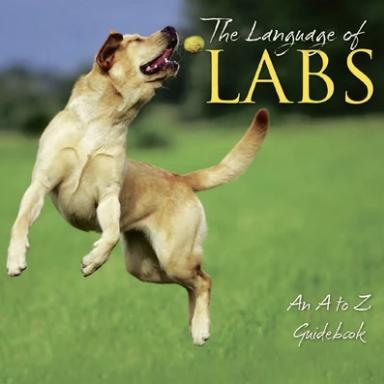 Labs speak to us not in words, but through example. We learn their vocabulary as well as valuable life lessons simply by being around them. Here is a light-hearted A through Z romp depicting such admirable Lab traits as Acceptance, Bravery, Curiosity, Determination and Zeal. Dazzling color photographs coupled with thoughtful and humorous quotes combine to make this cheerful book irresistible to Lab lovers. Buy Now
Labs speak to us not in words, but through example. We learn their vocabulary as well as valuable life lessons simply by being around them. Here is a light-hearted A through Z romp depicting such admirable Lab traits as Acceptance, Bravery, Curiosity, Determination and Zeal. Dazzling color photographs coupled with thoughtful and humorous quotes combine to make this cheerful book irresistible to Lab lovers. Buy Now

